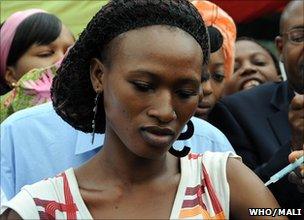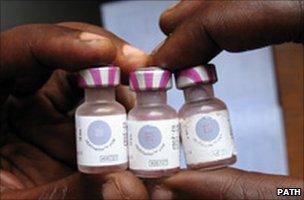New jab for millions across African 'meningitis belt'
- Published

A woman in Mali was among the first to receive the new vaccine prior to the official launch
Health officials say they will begin the roll out of a new meningitis vaccine for sub-Saharan Africa on 6 December.
The vaccine, which has been developed in India, costs less than fifty US cents a dose and clinical tests suggest it could offer protection for between 10 and 15 years.
Seasonal epidemics of meningitis kill thousands in Africa every year.
Vaccinations will start in Burkina Faso, then move to Niger and Mali.
Meningitis belt
Officials say clinical trials of the new vaccine have shown it to be highly effective in protecting against Meningitis A - a form of meningitis which kills thousands of young people each year across a swathe of sub-Saharan Africa dubbed the "meningitis belt".
The vaccine is similar in concept to the one used successfully in Britain to tackle Meningitis C.
If all goes to plan, it will first be offered to anyone aged between one and 29 years across 25 African states from Senegal in the west to Somalia in the east.
The drug was developed in India at the cost of the Bill & Melinda Gates Foundation, but much more money will be required to complete the initial vaccination programme - some $570 million according to World Health Organization officials.
It is hoped the majority of this money will come from donor organisations, with the rest coming from the African states.
Speaking at a press conference in London ahead of the official launch of the programme, Dr Marc LaForce of the Meningitis Vaccine Project, said the low cost of the new vaccine made it something Africa could afford.

Vials of the new vaccine carry stickers that change colour with exposure to damaging heat
"This vaccine costs less than 50 cents a dose," he said. "When we first had discussions with Africans, they basically implored us 'please do not make a vaccine we cannot afford - that's worse than having no vaccine at all.'"
Costly alternatives
Meningitis A kills one in ten of those infected. Brain damage, deafness or learning disabilities can afflict those who survive.
It is caused by the bacterium Neisseria meningitidis group A, which mostly attacks infants, children, and young adults. It accounts for ninety per cent of all meningitis epidemics in Africa.
The outbreaks strike during the dry season. In 1997, in the worst epidemic on record, 25,000 people died.
Vaccines which protect both against Meningitis A and other forms of the infection are already available but cost much more and only offer short-term protection.
Dr Jean-Marie Okwo-Bele, Director of the WHO Department of Immunization, Vaccines and Biologicals, told the conference the vaccine represented a great achievement.
"Having this vaccine is a huge accomplishment in public health, because this will affect the lives of 450 million people who are at risk of this disease and who live in the very well known African meningitis belt."
The vaccine has been developed by the Serum Institute of India Ltd, but the license for the drug will be retained by PATH, an international nonprofit organisation.
- Published15 October 2010